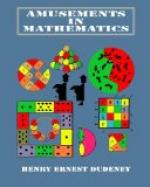“Reginald is quite right,” said Mr. Filkins, “about the first coin. The second one could not exist, because the first George would never be described in his lifetime as ‘George I.’”
“Why not?” asked Mrs. Allgood. “He was George I.”
“Yes; but they would not know it until there was a George II.”
“Then there was no George II. until George III. came to the throne?”
“That does not follow. The second George becomes ‘George II.’ on account of there having been a ‘George I.’”
“Then the first George was ‘George I.’ on account of there having been no king of that name before him.”
“Don’t you see, mother,” said George Allgood, “we did not call Queen Victoria ‘Victoria I.;’ but if there is ever a ‘Victoria II.,’ then she will be known that way.”
“But there have been several Georges, and therefore he was ‘George I.’ There haven’t been several Victorias, so the two cases are not similar.”
They gave up the attempt to convince Mrs. Allgood, but the reader will, of course, see the point clearly.
“Here is a question,” said Mildred Allgood, “that I should like some of you to settle for me. I am accustomed to buy from our greengrocer bundles of asparagus, each 12 inches in circumference. I always put a tape measure round them to make sure I am getting the full quantity. The other day the man had no large bundles in stock, but handed me instead two small ones, each 6 inches in circumference. ’That is the same thing,’ I said, ‘and, of course, the price will be the same;’ but he insisted that the two bundles together contained more than the large one, and charged me a few pence extra. Now, what I want to know is, which of us was correct? Would the two small bundles contain the same quantity as the large one? Or would they contain more?”
“That is the ancient puzzle,” said Reginald, laughing, “of the sack of corn that Sempronius borrowed from Caius, which your greengrocer, perhaps, had been reading about somewhere. He caught you beautifully.”
“Then they were equal?”
“On the contrary, you were both wrong, and you were badly cheated. You only got half the quantity that would have been contained in a large bundle, and therefore ought to have been charged half the original price, instead of more.”
Yes, it was a bad swindle, undoubtedly. A circle with a circumference half that of another must have its area a quarter that of the other. Therefore the two small bundles contained together only half as much asparagus as a large one.
“Mr. Filkins, can you answer this?” asked Willie. “There is a man in the next village who eats two eggs for breakfast every morning.”
“Nothing very extraordinary in that,” George broke in. “If you told us that the two eggs ate the man it would be interesting.”
“Don’t interrupt the boy, George,” said his mother.
“Well,” Willie continued, “this man neither buys, borrows, barters, begs, steals, nor finds the eggs. He doesn’t keep hens, and the eggs are not given to him. How does he get the eggs?”




